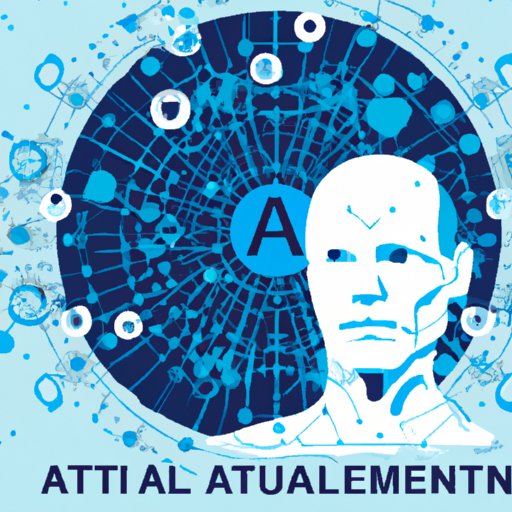Introduction
Artificial intelligence (AI) has become one of the most talked-about topics of the 21st century. AI has been around for decades, but recent advances in technology are making it more accessible and powerful than ever before. But what exactly is AI, and how will it affect our lives? This article provides an overview of AI and examines its impact on society, its history of development, the different types of AI, and its role in businesses.
Exploring the Basics of Artificial Intelligence
To understand AI, it’s important to first define it. According to the American Association for Artificial Intelligence, “Artificial intelligence (AI) is the science and engineering of making intelligent machines, especially computer programs.” In other words, AI is the process of creating systems that can think and act like humans. AI is a broad field that encompasses many different technologies, including machine learning, natural language processing, robotics, and more.
So how does AI work? Simply put, AI works by taking in data, analyzing it, and then using this information to make decisions or take actions. For example, AI can be used to identify patterns in large datasets, such as customer purchase histories. AI can also be used to automate processes, such as driving a car or recognizing objects in images.
There are several different types of AI, each with its own set of capabilities and applications. Narrow AI, also known as weak AI, is focused on a single task and is commonly used in automation and search engines. General AI, also known as strong AI, is focused on multiple tasks and is used for decision-making and problem-solving. Finally, super AI is a hypothetical form of AI that is capable of performing any task better than humans.

The Impact of AI on Society
AI has had a significant impact on society, both positive and negative. On the positive side, AI has been used to improve healthcare, increase efficiency, reduce costs, and create new jobs. For example, AI-powered chatbots have been used to provide medical advice to patients, while AI-driven automation has reduced costs and improved productivity in manufacturing.
On the other hand, AI has been linked to a number of potential challenges. These include job displacement, privacy concerns, and ethical issues related to the use of AI-powered decision-making. As AI continues to evolve, it is important to consider the potential implications of these issues. According to a study conducted by McKinsey Global Institute, “AI could potentially create economic value of up to $13 trillion by 2030, but it will also disrupt labor markets and cause job losses.”

Examining the History of AI Development
AI has a long and fascinating history. The concept of AI dates back to the 1950s, when researchers began to explore the possibilities of creating computers that could think and reason like humans. Over the years, AI has evolved from simple rule-based algorithms to complex deep learning systems. Today, AI is being used in a wide range of industries, from healthcare to finance and beyond.
In recent years, AI has made significant strides. Advances in machine learning and natural language processing have enabled AI to perform tasks that were once thought impossible. For example, AI-powered facial recognition technology is now being used in security systems, while AI-driven robots are being used to perform complex tasks in manufacturing.

Understanding the Different Types of AI
As mentioned earlier, there are several different types of AI. Narrow AI is focused on a single task, such as playing chess or recognizing faces. General AI is focused on multiple tasks, such as decision-making and problem-solving. Finally, super AI is a hypothetical form of AI that is capable of performing any task better than humans. It is important to note that none of these types of AI currently exist, though research is ongoing.
Investigating AI’s Role in Businesses
AI has become increasingly important in the business world. AI-powered automation has been used to reduce costs and improve efficiency in manufacturing. AI-driven analytics have been used to identify trends and make predictions about customer behavior. And AI-powered decision-making has been used to make more informed decisions faster. AI is becoming an integral part of businesses in all industries, from retail to finance and beyond.
Conclusion
AI has become an increasingly important part of our lives, impacting everything from healthcare to business. AI is a broad field that encompasses many different technologies, including machine learning, natural language processing, and robotics. AI has had both positive and negative impacts on society, and its implications for the future are still being explored. As AI continues to evolve, it is important to consider the potential implications of its use and development.
(Note: Is this article not meeting your expectations? Do you have knowledge or insights to share? Unlock new opportunities and expand your reach by joining our authors team. Click Registration to join us and share your expertise with our readers.)
